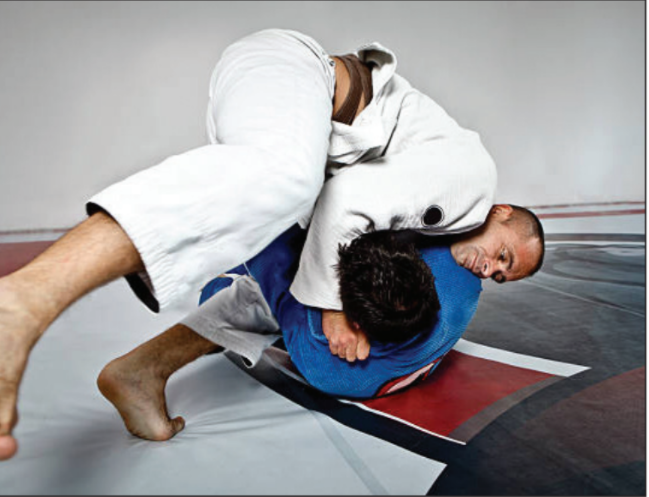In my last article, I described the basic foundations of self-defense that anyone can apply — but what about people ready and willing to make a real commitment to learn a martial art? There are many choices out there, but only a few are worth the time.
First, any martial art with a competitive sports aspect will be far above the ones where you spend most of your time learning a complex dance routine. This will offend many who have dedicated their lives to some of the popular martial arts in the ‘70s and ‘80s but this has already been tested and proven in mixed martial arts cages, where competitors whose training was based in combat sports ruled the roost. In order to learn to fight, you need to pressure-test your skills and inoculate yourself from adrenaline by approximating it in competition.
So which martial art can provide the best result in a minimum effective dose? Without question, it is Brazilian jiu-jitsu (BJJ). This is not only because BJJ is my primary area of study but because it has been tested in real-life situations and is geared towards techniques that work well for smaller, weaker individuals. It utilizes effective strategies of leverage and can be adapted to your size, shape and personality.
For men, earning a blue belt (usually, one year of dedicated training) means that you have built basic competency and can successfully handle a physical confrontation with most untrained people. You will understand how to manage distance and positioning. You will develop balance and learn how to control most attackers. You will have an arsenal of chokes, joint locks and pain locks at your disposal and will have developed a new level of confidence and calm in uncomfortable situations.
For women, you will be training with men in most schools, and therefore nearly all your opponents will be physically stronger than you. Within that same year, your ability to slip out of attacks and escape will be proficient enough to empower you to flee to safety. Your real-life opponent will quickly conclude you are more than he is willing to tangle with.
We teach students how to control opponents from standing to the ground while staying on top, in position and in control.
I can hear questions now such as, “What about multiple attackers?” or “Good luck when you’re on your back on the ground and my pal soccer balls your head!” Let’s talk about that. What is the best martial art for multiple attackers? It’s called “Run So Fast.” It’s the oldest of all defensive arts and should be the first thing you learn. But sometimes you can’t run fast enough, and when we review actual footage of hostile encounters, the better martial artists rely on managing the distance, the confusion of multiple attackers and getting out of the situation quickly.
Addressing the second point, most people are familiar with jiu-jitsu ground techniques and what has become popular after the evolutionary years of Sport BJJ, and not with the older BJJ promoted by Rickson Gracie and taught at my Jean Jacques Machado School. We have mostly first responders and teach BJJ as a life-or-death skill and not a game.
With our focus, we teach students how to control opponents from standing to the ground while staying on top, in position and in control. We certainly teach the guard (back to the ground) but as something to move through on the way to improving our position and dominance. We also focus on positions like knee on belly, which transitions into a handcuffing position for police, keeps your head up and aware, allowing you to disengage with ease if you need to address other attackers or move to a deadlier tool in your arsenal.
Are there other martial arts to consider? Sure. Again, the rule is that anything that has a sports component to it usually has competitive “sparring.” You need to batter and bruise yourself with a partner to build a fighting skill. The most dangerous opponents are fighters who have trained and competed in BJJ, muy Thai, kickboxing, boxing or wrestling. I mean no offense to the Krav Maga crowd and have many friends in that universe (many train with me), but many techniques cannot be pressure-tested easily in training. This can create a situation where an experienced bar brawler who spent his youth beating up college football players can wreck a Krav guy’s day simply because he is used to the explosive violence of a real exchange.
Can you learn anything useful in a one-time class? Yes. If I were forced to give you an hour of training, what would I teach? Situational awareness first, then defensive postures. In any confrontation, I’d teach you to have your hands up, palms facing out at shoulder height. It looks like a placating de-escalating gesture and can be instinctively used to block strikes and chokes. I’d focus on how to escape an attack, not how to fight. I’d teach you how to control distance and how to use your environment to your advantage.
Then, I’d teach you what other tools we have at our disposal, but we’ll save that for our next article.
Bryce Eddy is an executive at Covered6, a physical security services and vocational training school. He is also co-founder of 805 Combat Sports/ 805 Machado Brazilian jiu-jitsu and the training company www.JoinTheRatio.com launching in early 2022.

